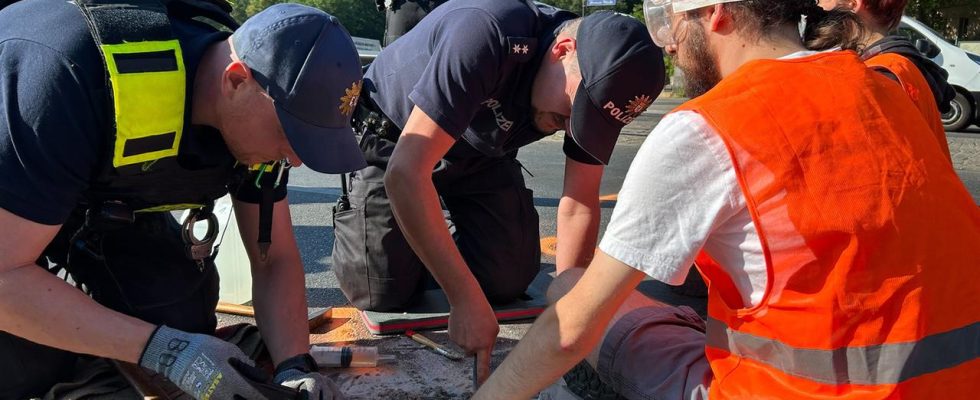exclusive
After almost two years of protest, disappointment and exhaustion are evidently spreading among the “Last Generation”: the leadership team of climate activists is now demanding loudly MDR-Research also focuses on new forms of protest.
The Last Generations are changing their strategy. The management team announced this to its members in an internal video call. The plans were set out in a strategy paper MDR Investigative is present. This shows, among other things, that the group wants to exploit public appearances by politicians as a stage for their protests in the future.
There are apparently several reasons for the change in strategy. The activists had hoped that their blockades and sticking actions in the summer would lead to a “social tipping point”. The idea behind it: The movement should grow and the population should largely show solidarity with the goals of the climate protection movement.
But the movement had to realize that this did not happen, said Kim Schulz, a member of the six-person core team of the “Last Generation,” in an internal video call. A recording of this “compass call” lies MDR Investigative before. Accordingly, the group is in a phase of perceived disappointment and is suffering from symptoms of exhaustion.
After almost two years of protest, normalization has taken place. Violence against activists by angry drivers would increasingly rarely lead to public outrage. The same applies to excessively harsh police operations. It would become increasingly difficult for the group to create the publicity needed for their protest.
Legal proceedings paralyze the activists
In addition, says Schulz, the hard core of the group in particular is increasingly having to answer in court. The proceedings not only tie up time resources, but are also emotionally challenging for the defendants. This weakens the group’s ability to act.
So far, the Berlin public prosecutor’s office alone has initiated more than 2,500 cases against members of the “Last Generation”. The highest punishment so far: eight months in prison without parole. This verdict came for taking part in three road blockades.
In addition, investigations are underway against several members on suspicion of forming a criminal organization. There were telephone surveillance and house searches. This pressure from the investigative authorities also leaves its mark on the members of the “last generation,” said Schulz. One consequence: long-term blockade phases and sticking campaigns would be difficult to carry out without first recruiting new members.
New form of protest is based on the US model
This is one of the reasons why the “Last Generation” wants to focus primarily on new, high-profile protest strategies in the future. A climate protection movement from the USA called “Climate Defiance” serves as a model. The group, which has been active since March of this year, specializes in disrupting events organized by political actors and using them as a stage for their protests.
Like the “Last Generation”, it is pursuing a strategy of civil disobedience – and there is also a common donor in the background: the “Climate Emergency Fund”, a non-profit organization based in California that financially supports climate protection movements worldwide.
In the internal round, the “Last Generation” has now announced that it has discussed forms of protest with the group “Climate Defiance”, in particular the so-called “confrontation protest”. In the internal strategy paper, that MDR Investigative available, it is described as follows:
A group of at least ten people attend an event where a politician is speaking. They spread out in the audience. In the right place, one person stands up and confronts the politician about his actions and lies. She doesn’t get involved in discussions and doesn’t let him talk his way out of it. (…) The other people in the audience stand up and go onto the stage shouting. The security tries to pull people off the stage, but they keep going back. Some are stuck in place and cannot be dragged off the stage. The event must be canceled.
Berlin should be colored orange
This change in strategy among resistance groups like the “Last Generation” comes as no surprise to protest researchers. Sociologist Graeme Hayes researches the climate protection movement’s forms of protest at Aston University in Birmingham and says: “The movement assumed that if activists went to prison, there would be major expressions of solidarity from civil society. But there has been the hoped-for public outcry it didn’t exist.”
The public impact of sticking actions and road blockades is decreasing, says Hayes, also because the police are now better prepared for the protests. In addition, activists are increasingly being sentenced to prison.
For Hayes, the question is how the climate protection movements will react to whether and to what extent there will be further radicalization within the civil disobedience movements: “If the government tries to prevent the protest through police and judicial measures, what “What will activists do next? I think that will be the theme in the coming years.”
The “Last Generation” at least, as follows from the strategy paper, wants to refrain from further radicalization and is currently distancing itself from sabotage actions. Last year, the group closed oil pipelines, among other things. The relevant proceedings on suspicion of sabotage have not yet been completed.
The group wants to stick to protest marches, blockades and also “high level protests”, such as blockades of airports. To achieve this, as large parts of Berlin as possible should be colored orange. “Orange Uprising” is what this is called in the language of the movement. According to the strategy paper, the climax of this form of action is planned for the last week of November.

